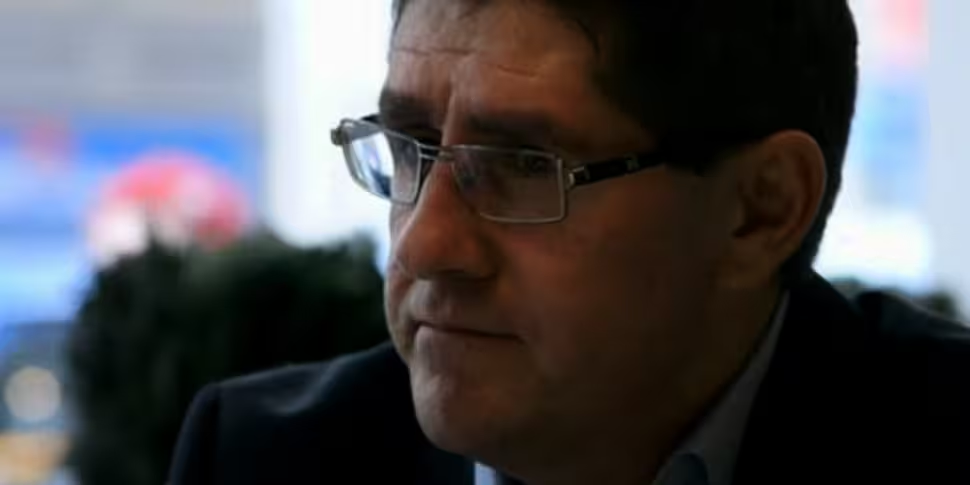The main sporting news today came from The Sunday Times, where it was revealed that the results of 12,000 blood test from 5,000 athletes were examined, and they showed that one third of the medals awarded to athletes at top-level endurance events, Olympic Games and World championships were won by athletes who have recorded suspicious drug tests.
Damien Lawlor and Paul Kimmage joined the Off The Ball to talk about this huge story, and when Adrian Barry put it to Kimmage that this was not definitive proof, but did raise plenty of suspicion, he disagreed: "For me this is absolute conclusive evidence that what we've been looking at in athletics mirrors what we've been seeing in cycling since 2001, and that is that it's totally discredited and a complete sham."
Speaking about a specific race, which The Sunday Times profiles in their piece, Kimmage tells the story of the 1500m at the 2005 World Championships, where Maryam Yusuf Jamal was leading and looking like she might win, when suddenly she was swamped and passed out by a number of Russian athletes in the race to the line.
"All of those on the podium (in that race) were subjected to blood tests that were stored by the IAAF [...] and the results of those tests would have shown conclusively that there was an almost statistic impossibility that those athletes could have done this without doping".
The responsibility now falls on the IAAF, according to Kimmage, to do something about this report: "They've had all this data for the guts of a decade, and they would have know what was happening in the sport, known exactly what was going on by having this data analysed. But we haven't seen any evidence of that in the way that they've policed the sport or the sanctions they're giving out". He went on to describe them as a "governing body that isn't trying to tackle this problem but is rather just trying to manage it".
Both Mo Farah and Usain Bolt were named as having recorded no suspicious tests, however, something which was given pride of place in the report in the paper. Rather than being a point of pride, Kimmage once again questioned the decision to include that, and pointed out that the two experts consulted in the piece, Robin Parisotto and exercise physiologist Michael Ashenden, would not have named names like that. For him, this then suggested that the decision to highlight those athletes did not come from the right sources, and was cause for concern: "This is the question: this sport stinks. That doesn't make them (Farah and Bolt) good, that makes them absolute supermen if they're clean. And fantastic if they are".
Turning their eye closer to home, the panel also discussed how the statistics were broken down by nation, and while there wasn't a huge amount of detail on Irish athletes, some could be extrapolated from the charts in the piece. The stats showed that Ireland had a 3% level of abnormal blood tests, and as Kimmage pointed out, Britain recorded a level of 4% of abnormal tests, which worked out at 12 athletes, "so we have maybe 8 or 9 athletes who have had abnormal tests".
"I'm going to be really interested in the reaction of our own athletes about this. Derval (O'Rourke) and (David) Gillick [...] and I would hope there would be outrage, absolute outrage from all those clean athletes that have had to deal with this over the past decade, because that's what it will take to change anything". This was a point that Damian Lawlor agreed on also, asking "who takes the baton from here now to press ahead? It won't be the IAAF. Surely the athletes themselves have a duty of care to speak up now [...] to expose what's going on around them. They all know what's happening, and who's doing it".
Kimmage continued the point, stating that the questions being raised about the sport as a whole now, presented them with a chance to clean things up: "You've got to just open the door and show the filth and the crap for what it is. Until you do that you can't ever move on. Transparency and honesty is the only way this ever gets solved, and the IAAF have been dragged to the door to confront it. We see a picture that is really ugly and now they've got to deal with it."
Before the discussion closed, Kimmage brought attention to what could well be the most important point to come from all this, which is the importance of using this information to help young athletes to see the dangers of doping.
"There's another important point here, and that's what this is really all about. Ok it's the cheating and it's exposing that and bringing accountability to those who have cheated, for sure. It's also protecting young athletes. There's a story (in the coverage) about a Kenyan runner who used EPO and died, and we've had that in cycling, we've had a spate of these deaths in cycling and nobody mentions them at all [...] This stuff costs lives, it ruins lives, and that's why it has to be addressed".
You can listen to the full review of the doping story below.









